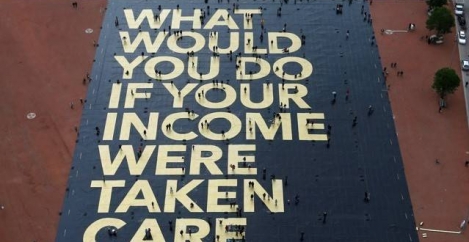September 6, 2017
More nations trial universal basic income as report suggests it could provide a major economic boost
 The much talked about idea of a Universal Basic Income in developed economies is now attracting greater political momentum, at the same time that a major new research project from an American think tank sets out the potential economic benefits. Yesterday, Scotland’s First minister Nicola Sturgeon called for research into the plausibility of a “citizens’ basic income” in a speech to the Scottish Parliament. Her appeal follows an announcement on the same day that Hawaii is to become the first US state to formally explore the idea. A trial is already under way in Finland, although a recent report in the New York Times suggests it is deeply flawed.
The much talked about idea of a Universal Basic Income in developed economies is now attracting greater political momentum, at the same time that a major new research project from an American think tank sets out the potential economic benefits. Yesterday, Scotland’s First minister Nicola Sturgeon called for research into the plausibility of a “citizens’ basic income” in a speech to the Scottish Parliament. Her appeal follows an announcement on the same day that Hawaii is to become the first US state to formally explore the idea. A trial is already under way in Finland, although a recent report in the New York Times suggests it is deeply flawed.
Both announcements coincide with the publication of a report from a team of economists at the Roosevelt Institute which suggests that the introduction of a guaranteed income of $1,000 a month for all Americans, financed by an increase in federal debt, would accelerate US economic growth by an additional 12.56 percent over a period of eight years. The report also claims that if the same idea were to be financed by a redistributive system of taxes, the growth impact would be smaller, producing an additional 2.62 percent of GDP growth over 8 years. In both scenarios, unemployment would decrease, according to the report.
However, when modelled on a plan that pays for UBI by simply raising taxes on households, the research found no effect on the economy. “In effect, it gives to households with one hand what it is takes away with the other,” the report concludes.
The idea has become closely associated with the advent of automation and artificial intelligence, in that it is seen as a possible bulwark against the social and economic shocks likely to hit jobs in the very near future. It has gained a number of high profile proponents including Mark Zuckerberg, Richard Branson and Elon Musk.
The report from the Roosevelt Institute are based on people’s ‘marginal propensity to consume’, which suggests that lower income households are more likely than their wealthier counterparts to increase their spending as a result of increased income. So, any injection of cash in the form of UBI would find its way very quickly into the economy.
However, the report also cautions that the foundation of a $1,000 a month UBI in the US would depend on a tax increase of somewhere between 21 percent and 35 percent for the top 10 percent of American earners, which would make it politically tricky, as would the suggestion that paying people a guaranteed income might reduce their motivation to find work or be creative.
Image: Basic Income Switzerland













